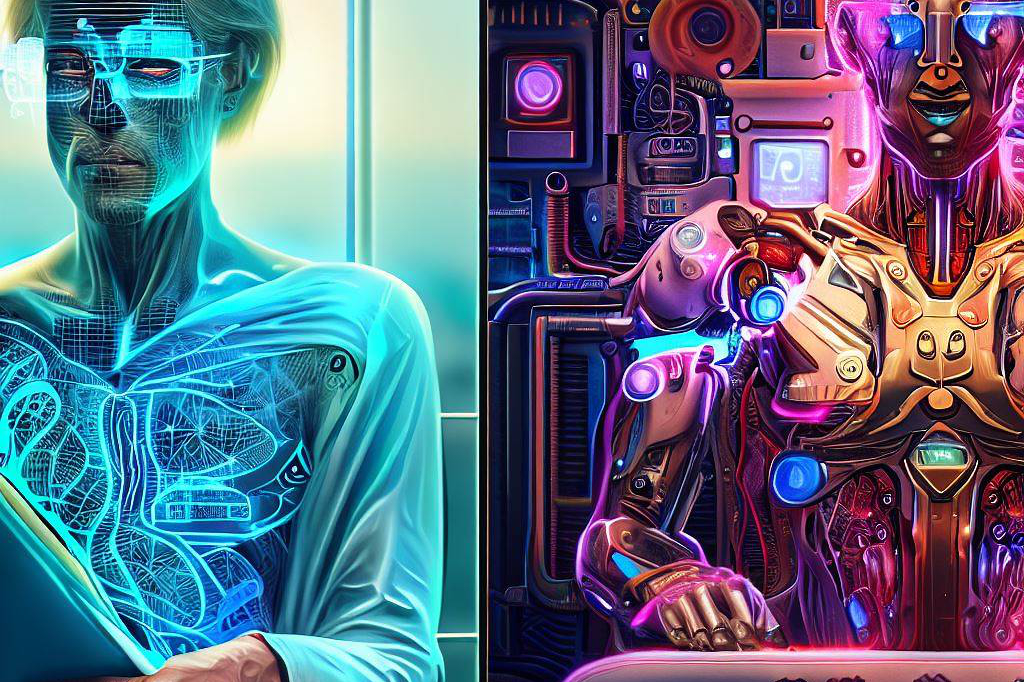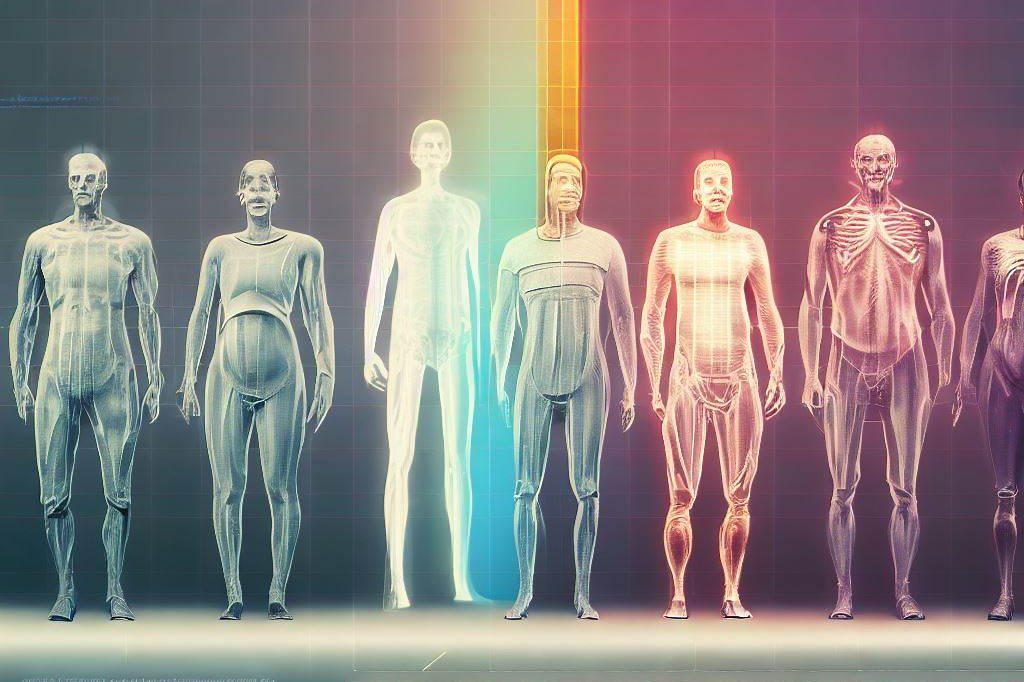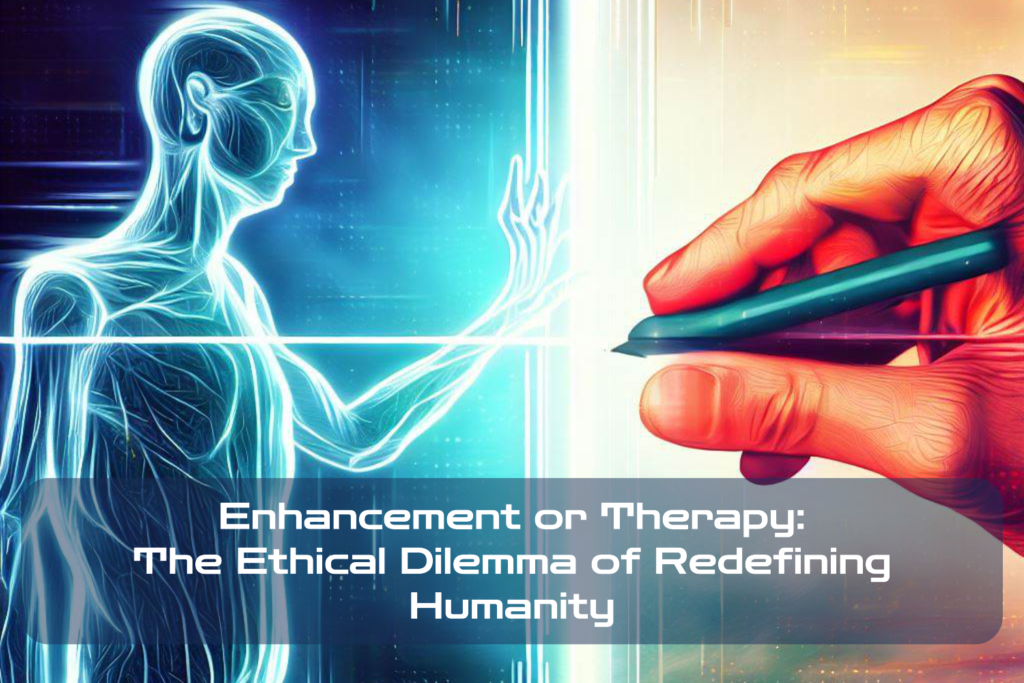Human enhancement refers to the use of technology to improve human physical, cognitive and genetic abilities beyond their natural state. This includes technologies such as prosthetics, brain implants, memory-enhancing drugs, or gene editing. In essence, human enhancement aims to push the boundaries of what it means to be human by enhancing our capabilities beyond what evolution has provided us.
The Implications of Human Enhancement
The implications of human enhancement are both exciting and concerning. On one hand, it promises to cure diseases, improve quality of life for disabled individuals and boost overall human performance in various domains such as sports or work. In other words, it provides an opportunity for us to better ourselves as individuals and society as a whole.
However, on the other hand, there are concerns about the potential abuse or misuse of these technologies and their impact on social equality. The ability to enhance oneself can lead to unfair advantages in areas such as education or employment opportunities among individuals who can afford such enhancements.
The Importance of Drawing a Line Between Therapy and Enhancement
Drawing a line between therapy (the treatment or prevention of disease) and enhancement is crucial in determining what types of enhancements are permissible or ethical. While therapeutic interventions are generally accepted as beneficial for improving health outcomes among individuals who suffer from illness or injury; enhancements that go beyond what’s considered “normal” could be potentially dangerous.
Therefore, defining where the line between therapy and enhancement lies becomes critical in protecting humanity against potential harm caused by technological advancements that could compromise our natural abilities. Human enhancement represents a significant advancement in healthcare technology; however; ethical considerations must be taken into account when deciding which enhancements will benefit society without violating basic principles such as fairness or safety.
Defining Human Enhancement

What is Human Enhancement?
Human enhancement can refer to anything that improves our abilities beyond what nature has given us.
Physical enhancements can include things like prosthetics, exoskeletons, and muscle implants that enhance strength or endurance.
Cognitive enhancements can involve drugs that boost memory or focus, brain implants that improve decision making or learning speed, or even virtual reality training programs designed to enhance mental agility.
Genetic enhancements are perhaps the most controversial type of human enhancement as they involve altering an individual’s DNA in order to confer specific traits such as disease resistance or increased intelligence. Gene-editing tools like CRISPR have made genetic enhancement more feasible than ever before.
Examples of Human Enhancement Technologies
There are countless examples of human enhancement technologies, ranging from simple devices like glasses that improve vision to more complex ones like brain implants that modify neuronal activity. Some examples of human enhancements include:
– Exoskeletons for physical strength and mobility enhancements
– Nootropics (smart drugs) for cognitive enhancment
– Genetic testing kits that are used to detect risk factors for certain diseases
– CRISPR gene editing technology used to modify genomes in order to combat genetic disorders.
As the field of human enhancement continues to advance rapidly, it is important for society to consider the ethical implications of these technologies before they become widespread.
The Ethics of Human Enhancement

Arguments for and Against Human Enhancement
The debate surrounding human enhancement is multifaceted, with arguments both for and against the development and use of such technologies.
One of the primary arguments in favor of human enhancement is that it can provide individuals with the opportunity to overcome limitations or disabilities. For example, prosthetic limbs can enhance physical abilities for those who have lost a limb, or cognitive-enhancing drugs can help those with ADHD or memory problems.
Additionally, some argue that human enhancement can lead to greater overall well-being and happiness by helping individuals achieve their full potential.
On the other hand, there are concerns about the potential negative consequences of human enhancement.
Some argue that these technologies could exacerbate inequalities by creating a divide between those who have access to enhancements and those who do not. There are also concerns about the impact on societal values, as enhancements could lead to a focus on individual achievement rather than collective progress.
The Impact of Human Enhancement on Society and Individuals
The impact of human enhancement on society and individuals is complex and multifaceted. While it has the potential to bring great benefits, such as increased productivity, improved health outcomes, and expanded capabilities, there are also significant risks associated with its use.
On an individual level, there is concern that enhancements may create an unfair advantage for some individuals over others. This could lead to increased competition in areas like education or employment where advantages gained through enhancements could overshadow other factors like hard work or natural ability.
At a societal level, there are also concerns about how advancements in human enhancement technology could exacerbate existing social inequalities. If certain groups have greater access to these technologies than others due to socioeconomic status or geographic location, this could lead to greater disparities in health outcomes and quality of life.
Ethical Considerations for Development and Use of Human Enhancement Technologies
Given the potential risks and benefits of human enhancement, there are a number of ethical considerations that must be taken into account in the development and use of these technologies.
One important consideration is ensuring that access to enhancements is based on need rather than wealth or privilege. This may involve developing policies to ensure that these technologies are available to all individuals regardless of their ability to pay.
Another key ethical consideration is ensuring that enhancements do not create an unfair advantage in areas like education or employment. This may require regulation to ensure that enhancements are used responsibly and do not undermine merit-based systems.
There is also a need for transparency around the development and use of human enhancement technologies. By promoting dialogue and debate around these issues, we can help ensure that the benefits of human enhancement are realized while minimizing its potential risks.
Drawing the Line Between Therapy and Enhancement

What is therapy?
Therapy is a medical or psychological intervention that aims to restore or improve a person’s health or well-being. It involves the diagnosis and treatment of disorders, symptoms, or injuries that impact a person’s ability to function.
Therapy can take many forms, such as medication, physical therapy, counseling, or surgery. The goal of therapy is to help the individual reach a normal state of functioning.
How does therapy differ from enhancement?
While both therapies and enhancements seek to improve human health and well-being, they differ in their goals. Therapy aims to bring individuals back to normal functioning while enhancement seeks to go beyond what is considered normal. Enhancements are designed not only to correct impairments but also to boost performance.
In addition, therapies are usually medically necessary interventions meant for people who have some type of disability/illness. Enhancements are elective procedures taken by individuals who choose them regardless of whether they have an illness or not.
Criteria for distinguishing between therapy and enhancement
Distinguishing between therapy and enhancement may be challenging; however, some criteria can help draw lines between them:
1) Medical necessity: Therapies are medically necessary interventions meant for people who require medical attention due to conditions that affect their health negatively.
2) Safety: Therapies must be safe because what they aim at is restoring health; enhancing risk-taking behaviours could lead individuals into dangerous situations
3) Intention: The intention behind an intervention matters in determining if it is therapeutic or enhancing
4) Accessibility: therapies should only be prescribed by doctors who have carried out proper diagnoses on patients,
It’s important that we understand these differences because blurring the lines between these two concepts has significant ethical implications for society. We must ensure that ethical considerations guide the development and use of human enhancement technologies.
Examples of Therapy vs Enhancement

Physical Enhancements: Prosthetics vs Cosmetic Surgery
When it comes to physical enhancements, the line between therapy and enhancement can be blurry.
Prosthetics, for example, are often seen as a form of therapy because they help individuals with disabilities gain mobility and independence.
On the other hand, cosmetic surgery is typically considered an enhancement because it alters one’s appearance for non-medical reasons. However, there are cases where prosthetics could also be considered enhancements.
For instance, a runner who amputated their leg may opt for a blade-like prosthesis that gives them a competitive advantage over other athletes with natural legs. This raises questions about fairness in sports and whether such enhancements should be allowed.
Cosmetic surgery, on the other hand, is often criticized for perpetuating unrealistic beauty standards and promoting negative body image issues. However, some argue that cosmetic surgery can increase an individual’s self-confidence and improve their quality of life.
Cognitive Enhancements: ADHD Medication vs Memory-Enhancing Drugs
The use of medication to manage conditions like Attention-deficit/hyperactivity disorder (ADHD) is generally accepted as therapy. ADHD medication helps individuals with the condition function better in daily life by improving their ability to focus and control impulsive behavior. Memory-enhancing drugs like modafinil or piracetam are often used by healthy individuals looking to improve cognitive performance beyond what is considered normal or average.
While some argue that these drugs could potentially enhance one’s ability to learn new skills or work more efficiently, others warn against the potential side effects. There are ethical concerns about cognitive enhancements that could potentially give some people an unfair advantage over others in areas such as education or employment.
Genetic Enhancements: Gene Therapy for Diseases vs Designer Babies
Gene therapy involves altering defective genes to treat or prevent various diseases. This type of genetic enhancement is generally considered therapy because it aims to restore normal function and improve health outcomes.
Designer babies, on the other hand, involve selecting specific desirable traits for a child before they are born. This type of genetic enhancement is often seen as ethically questionable because it raises concerns about eugenics and the potential consequences of creating a society where certain individuals are deemed more valuable than others based on their genetic makeup.
While gene therapy has shown promise in treating diseases like cystic fibrosis and sickle cell anemia, designer babies remain a controversial topic, with some arguing that they could lead to a society where people are judged solely based on their genetic traits rather than their individual abilities and character. Overall, the examples of therapy vs enhancement illustrate that drawing the line between these two concepts can be difficult due to ethical considerations and subjective opinions about what constitutes normal or enhanced states.
The Gray Area of Defining “Normal” and “Enhanced”

One of the biggest challenges in drawing the line between therapy and enhancement is the subjectivity in defining what constitutes a “normal” or “enhanced” state. For example, is it normal for a person to have 20/20 vision, or is wearing glasses or contacts considered an enhancement?
Similarly, is it normal for a person to have average intelligence, or should we strive for everyone to be above average? There are also cultural and societal factors at play when determining what is considered normal versus enhanced.
For example, in some cultures, it may be more acceptable to enhance physical abilities through performance-enhancing drugs, while in others it may be seen as cheating. Similarly, some societies value individualism and personal achievement over collective well-being, which could lead to a greater acceptance of enhancement technologies.
This subjectivity can make it difficult to establish clear criteria for distinguishing between therapy and enhancement. It also raises questions about who gets to decide what is considered normal or enhanced – should it be scientists? Governments? Society as a whole?
The Potential Misuse or Abuse of Technology
Another major concern when discussing human enhancement technologies is the potential misuse or abuse of these technologies. For example, if cognitive-enhancing drugs become widely available, will they only be accessible to those who can afford them? Will they give certain individuals an unfair advantage over others?
Similarly, genetic enhancements could lead to the creation of so-called “designer babies,” where parents select specific traits for their child before they are born. This raises ethical questions about eugenics and could perpetuate social inequalities based on genetics.
Furthermore, there is always a risk that any new technology could be used for harmful purposes. For example, if gene editing becomes more advanced and accessible, could someone use this technology to create biological weapons?
These concerns highlight the need for responsible development and regulation of human enhancement technologies. It is important to consider the potential risks and benefits of these technologies before they become widely available.
Is Drawing a Line Even Possible?

Given the challenges discussed above, some may argue that drawing a clear line between therapy and enhancement is impossible. After all, defining what is considered normal or enhanced will always be subjective to some degree.
However, while it may be difficult to establish clear criteria for distinguishing between the two, it is still important to have these conversations in order to minimize potential risks and ensure that these technologies are used ethically. One possible solution could be to involve multiple stakeholders – including scientists, ethicists, policymakers, and members of the public – in discussions about human enhancement technologies.
This could help ensure that diverse perspectives are taken into account when making decisions about the development and use of these technologies. Overall, while it may not be possible to draw a completely clear line between therapy and enhancement, it is still crucial that we continue to have these conversations in order to promote responsible use of technology and ensure that its benefits are accessible to all.
Final Thoughts

How to balance progress with ethical considerations
As technology advances at an ever-increasing pace, it can be difficult to keep up with new developments in human enhancement. Furthermore, determining what constitutes therapy versus enhancement can be subjective and open to interpretation.
One way to balance progress with ethical considerations is through interdisciplinary collaboration between scientists, ethicists, policymakers, and members of affected communities. By working together to establish clear guidelines for the development and use of human enhancement technologies, we can ensure that progress in this area is guided by ethical considerations.
Ultimately, the goal should be to create a future in which human enhancement technologies are developed and used in ways that promote social justice rather than exacerbating existing inequalities. By balancing progress with ethical considerations in our approach to human enhancements technologies, we can work towards realizing this vision.

C M, a seasoned editor, journalist, and consultant, is deeply fascinated by the convergence of technology, space, and the future of humanity.
With a particular interest in transhumanism, futurology, and the philosophical and ethical dimensions of these domains, C M serves as the lead contributor to TranscendSphere and SpaceSpotlight.
When not penning insightful articles on these rapidly evolving fields, C M indulges in their love for podcasts and books, proudly embracing their status as a ‘Happy Nerd Extraordinaire!’





